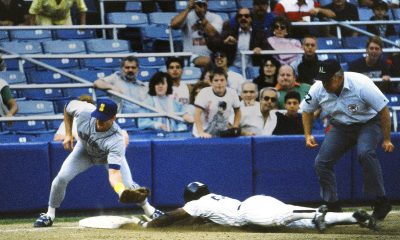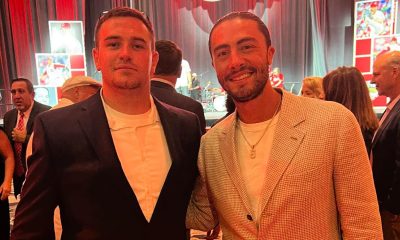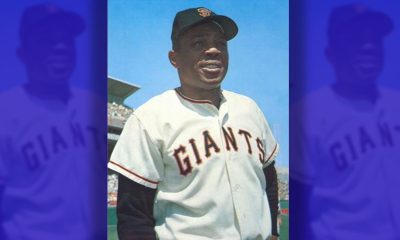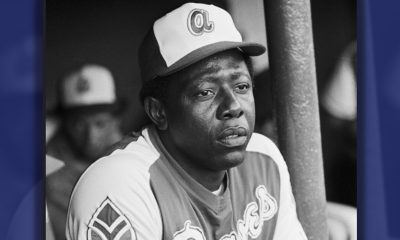Sports
A-Rod Gives Apology But No Explanation Ahead of Return

In this Jan. 16, 2014, file photo, Alex Rodriguez speaks during a news conference in Cancun, Mexico. Alex Rodriguez has issued a handwritten apology “for the mistakes that led to my suspension” but has turned down New York’s offer to use Yankee Stadium for a news conference and has failed to detail any specifics about his use of performance-enhancing drugs. (AP Photo/Israel Leal)
RONALD BLUM, AP Sports Writer
NEW YORK (AP) — It appears the only place Alex Rodriguez might detail his drug use is on a witness stand.
The ever controversial New York Yankees star decided against holding a news conference ahead of his return to the team following a one-year absence. He issued a vague five-paragraph handwritten apology Tuesday “for the mistakes that led to my suspension” but failed to provide specifics about how and why he resumed using performance-enhancing drugs for at least the second stretch of his celebrated career.
Readying to report back to the Yankees following an unprecedented season-long ban for violating baseball’s drug agreement and labor contract, Rodriguez apologized to team officials in person during a meeting at the ballpark on Feb. 10. They suggested he hold a news conference before the start of spring training this Friday and offered the use of Yankee Stadium.
Rodriguez declined.
He held an apologetic session with reporters in 2009 at the team’s facility in Tampa, Florida, after he admitted using banned PEDs while with Texas from 2001-03. That was before Major League Baseball had a drug agreement with penalties.
“The only thing I ask from this group today and the American people is to judge me from this day forward,” he said then.
But he apparently did not want to face questions from media about his latest involvement with PEDs — although he could be required to testify in federal court if his cousin, Yuri Sucart, and former University of Miami pitching coach Lazaro Collazo go to trial on charges they committed crimes in their involvement with the Biogenesis of America drug clinic. Rodriguez admitted in court documents he used PEDs.
ESPN The Magazine said it planned to release an interview Wednesday in which Rodriguez said he thinks Biogenesis owner Anthony Bosch gave him a placebo. Rodriguez also said he considered retirement early in his suspension, is in therapy and secretly visits colleges. He told ESPN he took a marketing class during his suspension and wants to complete his education.
Baseball Commissioner Bud Selig suspended the three-time AL MVP for 211 games in August 2013, citing conduct from 2010-12 uncovered during MLB’s investigation of Biogenesis, which was based in Coral Gables, Florida, not far from Rodriguez’s home.
Arbitrator Fredric Horowitz reduced the penalty to the 2014 season, finding “clear and convincing evidence” Rodriguez used three banned substances and twice tried to obstruct baseball’s drug investigation.
Hoping to overcome the suspension and a pair of hip surgeries, Rodriguez is due to report to the Yankees on Feb. 25 and start workouts the following day. He has not played a full season since 2007.
Rodriguez addressed his statement “to the fans” and said “I take full responsibility for the mistakes that led to my suspension for the 2014 season” without explaining what those mistakes were.
“I regret that my actions made the situation worse than it needed to be,” he wrote in legible blue script. “To Major League Baseball, the Yankees, the Steinbrenner family, the players’ association and you, the fans, I can only say I’m sorry.”
Rodriguez said “I accept the fact that many of you will not believe my apology or anything that I say at this point. I understand why, and that’s on me.”
“It was gracious of the Yankees to offer me the use of Yankee Stadium for this apology but I decided the next time I am in Yankee Stadium, I should be in pinstripes doing my job,” he said.
Bosch was sentenced to four years in prison on Tuesday after pleading guilty in October to a charge of conspiracy to distribute testosterone.
New York says Rodriguez, who turns 40 in July, has been replaced by Chase Headley at third base and will have to compete for playing time at designated hitter and as an infield backup.
Rodriguez is owed $61 million over the final three seasons of his contract, and the Yankees say they do not plan to pay five $6 million bonuses detailed in a marketing agreement for historic achievements he may reach. Rodriguez is fifth on the career list with 654 home runs, and the deal contemplates the first bonus being triggered when he ties Willie Mays at 660.
Before apologizing to the Yankees, Rodriguez met last month with Rob Manfred, who succeeded Selig as baseball commissioner on Jan. 25.
“I served the longest suspension in the history of the league for PED use,” Rodriguez said. “The commissioner has said the matter is over. The players’ association has said the same. The Yankees have said the next step is to play baseball. I’m ready to put this chapter behind me and play some ball. This game has been my single biggest passion since I was a teenager. When I go to spring training, I will do everything I can to be the best player and teammate possible, earn a spot on the Yankees and help us win.”
Copyright 2015 The Associated Press. All rights reserved. This material may not be published, broadcast, rewritten or redistributed.
Alameda County
Seth Curry Makes Impressive Debut with the Golden State Warriors
Seth looked comfortable in his new uniform, seamlessly fitting into the Warriors’ offensive and defensive system. He finished the night with an impressive 14 points, becoming one of the team’s top scorers for the game. Seth’s points came in a variety of ways – floaters, spot-up three-pointers, mid-range jumpers, and a handful of aggressive drives that kept the Oklahoma City Thunder defense on its heels.

By Y’Anad Burrell
Tuesday night was anything but ordinary for fans in San Francisco as Seth Curry made his highly anticipated debut as a new member of the Golden State Warriors. Seth didn’t disappoint, delivering a performance that not only showcased his scoring ability but also demonstrated his added value to the team.
At 35, the 12-year NBA veteran on Monday signed a contract to play with the Warriors for the rest of the season.
Seth looked comfortable in his new uniform, seamlessly fitting into the Warriors’ offensive and defensive system. He finished the night with an impressive 14 points, becoming one of the team’s top scorers for the game. Seth’s points came in a variety of ways – floaters, spot-up three-pointers, mid-range jumpers, and a handful of aggressive drives that kept the Oklahoma City Thunder defense on its heels.
One of the most memorable moments of the evening came before Seth even scored his first points. As he checked into the game, the Chase Center erupted into applause, with fans rising to their feet to give the newest Warrior a standing ovation.
The crowd’s reaction was a testament not only to Seth’s reputation as a sharpshooter but also to the excitement he brings to the Warriors. It was clear that fans quickly embraced Seth as one of their own, eager to see what he could bring to the team’s championship aspirations.
Warriors’ superstar Steph Curry – Seth’s brother – did not play due to an injury. One could only imagine what it would be like if the Curry brothers were on the court together. Magic in the making.
Seth’s debut proved to be a turning point for the Warriors. Not only did he contribute on the scoreboard, but he also brought a sense of confidence and composure to the floor.
While their loss last night, OKC 124 – GSW 112, Seth’s impact was a game-changer and there’s more yet to come. Beyond statistics, it was clear that Seth’s presence elevated the team’s performance, giving the Warriors a new force as they look to make a deep playoff run.
Barbara Lee
WNBA’s Golden State Valkyries Kick Off Season with Community Programs in Oakland
“The Golden State Valkyries are more than a team—they’re a movement,” said Oakland Interim-Mayor Kevin Jenkins. “Their touchdown in Oakland marks a new era of opportunity, inspiration, and equity in sports. This partnership reflects our city’s deep commitment to uplifting women, investing in youth, and building a community where every dream has a place to grow. We’re proud to welcome the Valkyries to The Town.”
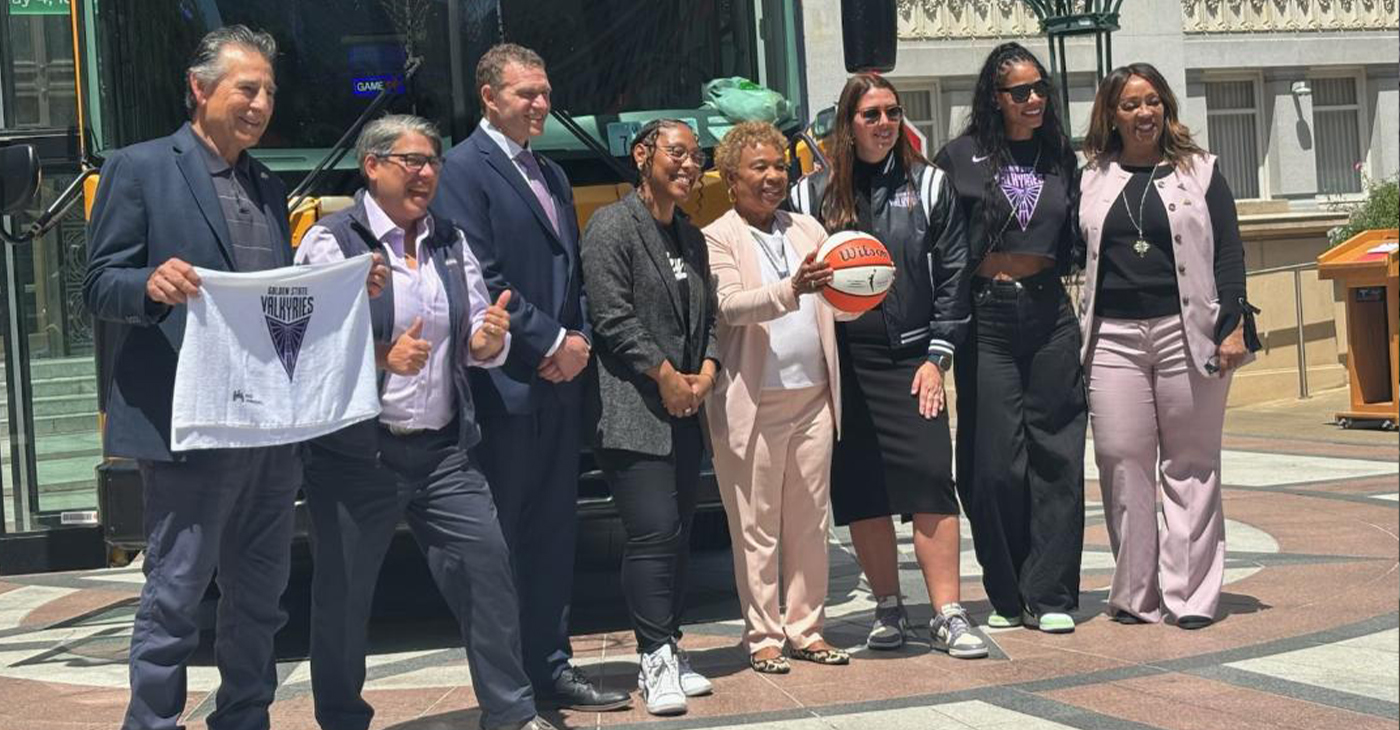
Team installs new nets at playgrounds, holds flag-raisings at City Halls in Oakland and S.F.
Special to The Post
The Golden State Valkyries brought the excitement of their inaugural season to every corner of the Bay Area with a full slate of community celebrations leading up to their historic home-opener against the Los Angeles Sparks at the Chase Center in San Francisco on Friday.
The week featured flag-raising ceremonies at city halls in Oakland and San Francisco, three “Violet Net” installation days at Oakland parks to encourage basketball play, fun “Hoopbus” takeovers at multiple schools presented by Kaiser Permanente, and player appearances.
“The Golden State Valkyries are more than a team—they’re a movement,” said Oakland Interim-Mayor Kevin Jenkins. “Their touchdown in Oakland marks a new era of opportunity, inspiration, and equity in sports. This partnership reflects our city’s deep commitment to uplifting women, investing in youth, and building a community where every dream has a place to grow. We’re proud to welcome the Valkyries to The Town.”
In total, 90 violet nets were installed on 45 basketball courts across 34 public parks throughout Oakland this week. A list of the parks receiving violet nets can be found at Valkyries.com.
About the Golden State Valkyries
The Golden State Valkyries, the WNBA affiliate of the seven-time NBA Champion Golden State Warriors, were announced as the 13th WNBA franchise on Oct. 5, 2023. According to Norse mythology, Valkyries are a host of warrior women who are fearless and unwavering – flying through air and sea alike.
This brand is Golden State’s modern interpretation of Valkyries: strong, bold, and fierce. Tipping off during the 2025 WNBA season, the team is headquartered in Oakland and will play home games at Chase Center in San Francisco. For Golden State Valkyries’ assets, including team logos, visit valkyries.com.
Activism
McClymonds High Names School Gym for Star Graduate, Basketball Legend Bill Russell
William “Bill” Felton Russell was born on Feb. 12, 1934, and died on July 31, 2022. He achieved fame as a U.S. professional basketball player who played center for the Boston Celtics of the National Basketball Association (NBA) from 1956 to 1969. He was the centerpiece of the Celtics dynasty that won 11 NBA championships during his 13-year career.
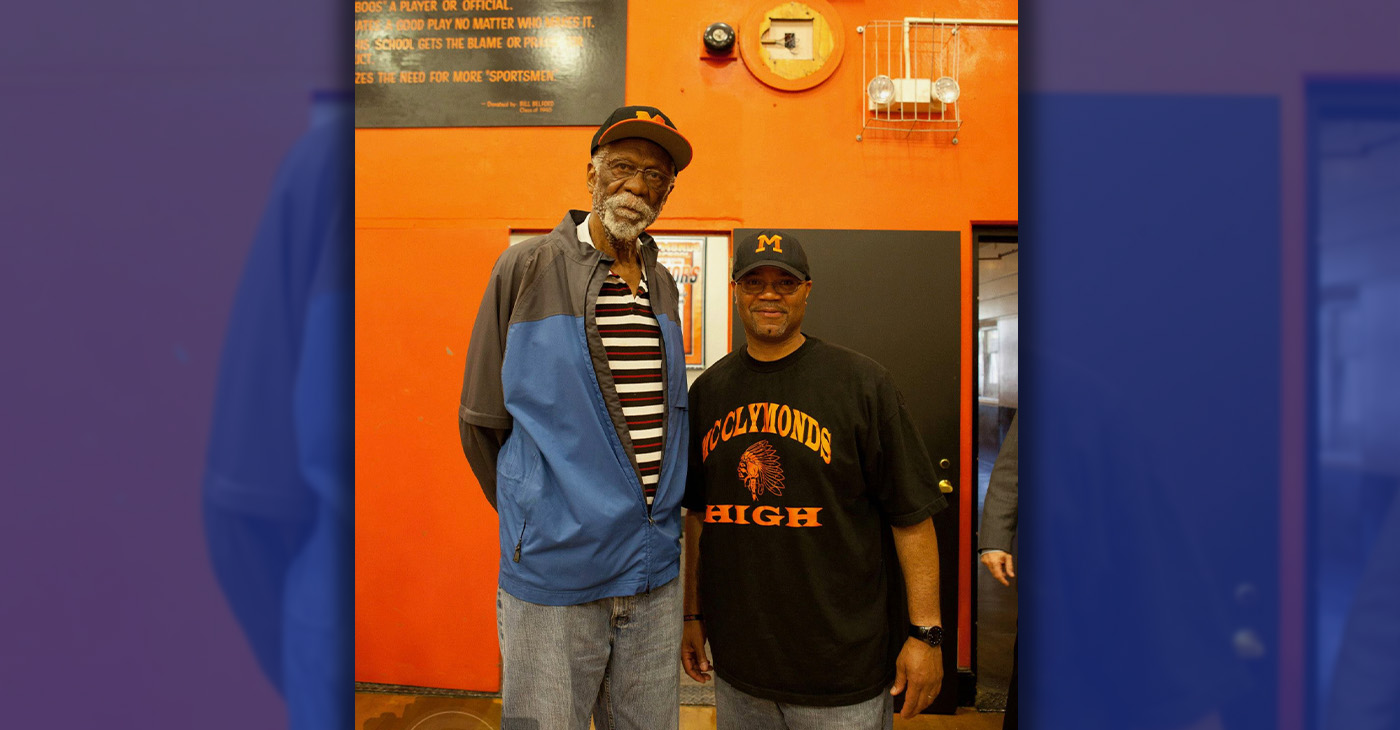
By Ken Epstein
West Oakland’s McClymonds High School, “the School of Champions,” this week named the school’s gymnasium in honor of one of its most famous graduates, basketball legend Bill Russell (class of ’52).
William “Bill” Felton Russell was born on Feb. 12, 1934, and died on July 31, 2022. He achieved fame as a U.S. professional basketball player who played center for the Boston Celtics of the National Basketball Association (NBA) from 1956 to 1969. He was the centerpiece of the Celtics dynasty that won 11 NBA championships during his 13-year career.
Russell is widely known as one of the greatest basketball players of all time. In 2011, he received the Presidential Medal of Freedom, the country’s highest civil honor, from President Barack Obama for Russell’s contributions to basketball and the Civil Rights Movement.
The McClymonds’ naming ceremony was held on Wednesday, the same day as Russell’s birthday. Oakland leader Bill Patterson, a longtime friend of Russell’s, was scheduled to cut the ribbon at the reopening of the gym, which had been closed for several months for renovation. Russell’s daughter Karen was scheduled to attend the ribbon cutting.
Russell’s name and signature are now printed on the gymnasium floor.
Patterson was working at DeFremery Park when he met Russell. “I befriended him as a boy and during his years at University of San Francisco” said Patterson. “We stayed friends for the rest of his life.”
Said McClymonds Principal Darielle Davis, herself a McClymonds graduate, “We are excited to honor Bill Russell for his sports accolades and because he broke color barriers. He is part of our legacy, and legacy is really important at McClymonds.”
Brian McGhee, community schools manager at McClymonds and former football player at UC Berkeley, said that Russell meant a lot to him and others at the school. “He was a beacon of light and hope for West Oakland,” he said. “He did a lot for sports and for civil rights.”
Starting in 2018, Ben “Coach” Tapscott worked with Patterson and other McClymonds grads, community members, and former coaches to encourage the Oakland Board of Education to endorse the naming of the school gym, which finally happened recently.
“We worked hard to make this happen,” said Tapscott. “He’s an important part of McClymond’s history, along with a lot of other famous graduates,” he said.
-

 Activism4 weeks ago
Activism4 weeks ago2025 in Review: Seven Questions for Black Women’s Think Tank Founder Kellie Todd Griffin
-

 Activism4 weeks ago
Activism4 weeks agoAnn Lowe: The Quiet Genius of American Couture
-

 Activism3 weeks ago
Activism3 weeks agoDesmond Gumbs — Visionary Founder, Mentor, and Builder of Opportunity
-

 Advice4 weeks ago
Advice4 weeks agoSupport Your Child’s Mental Health: Medi-Cal Covers Therapy, Medication, and More
-

 Activism3 weeks ago
Activism3 weeks agoFamilies Across the U.S. Are Facing an ‘Affordability Crisis,’ Says United Way Bay Area
-

 Alameda County3 weeks ago
Alameda County3 weeks agoOakland Council Expands Citywide Security Cameras Despite Major Opposition
-

 Alameda County3 weeks ago
Alameda County3 weeks agoBling It On: Holiday Lights Brighten Dark Nights All Around the Bay
-

 Activism3 weeks ago
Activism3 weeks agoBlack Arts Movement Business District Named New Cultural District in California



